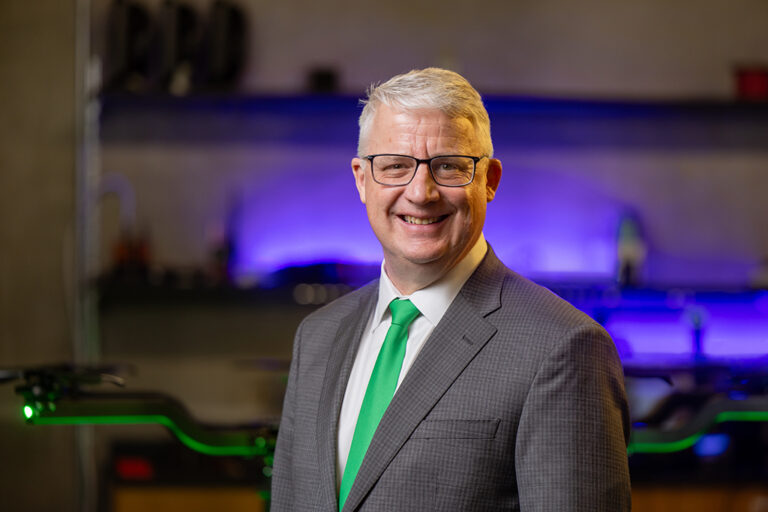Whirlwind semester
First-year faculty member RaeAnn Anderson receives early career grant, nominated for teaching award

RaeAnn Anderson is having a ball.
In her first semester at UND, the psychology faculty member has received an early career research award from the National Institutes of Health, been nominated for a teaching excellence award and has found joy in working with her students.
“I couldn’t have a better job,” Anderson said. “I have colleagues who support me and want me to succeed, resources to do my work, and great students.”
Anderson, an assistant professor of psychology and licensed psychologist, was hired to help address UND’s rural health Grand Challenge, part of the One UND Strategic Plan. She’s working to better understand how alcohol can fuel violence, with the goal of finding ways to intervene and prevent that violence.
Vote of confidence
An early career award from the National Institute on Alcohol Abuse and Alcoholism, part of the NIH, will fund her work for five years. The $850,000 K01 Career Development grant is intended to support researchers at the start of their academic career by providing research funding and mentoring.
Anderson’s early success is not a surprise, said Senior Vice Provost Debbie Storrs.

“She brings experience and a research focus aligned with UND’s Rural Health and Communities Grand Challenge that distinguished her from other applicants,” said Storrs. “We’re excited to see the many ways she will contribute and enrich our campus.”
“This is a big vote of confidence in my work,” said Anderson. “There are very few mechanisms that provide five years of funding. It provides resources to start my lab, and I will be able to support research students and scale up more quickly. I plan to use my resources very wisely.”
Anderson, originally from rural Kansas, earned her doctorate from the University of Wisconsin-Milwaukee. She did postdoctoral work at Kent State University, and originally thought she would research veterans and PTSD.
“There were a lot of veterans in my hometown,” Anderson said. “I was curious how people could have that experience and go back to baling hay.”
But then an advisor told her that more people suffer from PTSD as a result of rape than from combat, and she became interested in women’s health, especially in rural communities.
At UND, she’s looking at alcohol-facilitated violence on campuses.
“Young [college] women report experiencing rape more at certain times of the year, such as Halloween, tailgating, and Spring Break,” Anderson said, adding that universities do address the issue of alcohol use and sexual violence.
She’s looking at timing.
“Every campus is different,” she said. “I want to figure out high risk times and develop intervention resources that could work on any campus. This should be a preventable problem.”
Her work, she believes, can be scaled up to help women in rural areas.
“Violence, like other disparities, affects people with fewer resources, and it’s harder for them to recover,” she said. “If you live in a small town, it’s difficult to avoid the person who harmed you, and it can be hard to get therapy, especially in rural areas. I want to meet the unique needs that survivors in rural areas have, and to also look at alcohol use. It’s different in rural areas than urban areas.”
Teaching and research
In addition, Anderson, who teaches abnormal psychology, has been nominated for an outstanding teaching award – another rarity for a first-year faculty member.
“I spend time on student questions and share lots of anonymous anecdotes,” Anderson said. “I want to make my students more empathetic, and I emphasize real-life experiences. My students, when they become professional health care or other providers, will interact with people who are struggling. They write papers, not exams.”
She said she’s impressed by her students.
“They’re curious. They make connections between things and think about real-world implications.”
For example, she said, one student asked if insurance can run out for people with schizophrenia.
“I was pleased that students are thinking about how this plays out in real life. They need to know this when they are practicing.”
And as she practices her teaching and research, Anderson is grateful.
“I knew there would be a lot of learning with a new faculty position, getting to know people and starting my projects,” Anderson said. “But there has been so much more. I’m in a good whirlwind.”


